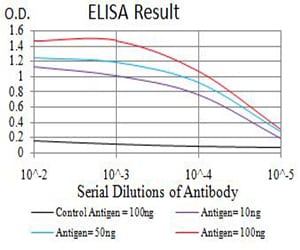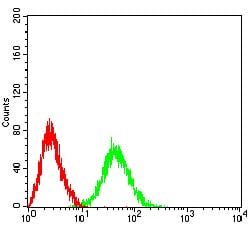

| WB | 咨询技术 | Human,Mouse,Rat |
| IF | 咨询技术 | Human,Mouse,Rat |
| IHC | 咨询技术 | Human,Mouse,Rat |
| ICC | 技术咨询 | Human,Mouse,Rat |
| FCM | 1/200 - 1/400 | Human,Mouse,Rat |
| Elisa | 1/10000 | Human,Mouse,Rat |
| Aliases | ATL1; RIT1; CTIP2; IMD49; CTIP-2; ZNF856B; ATL1-beta; ATL1-alpha; ATL1-delta; ATL1-gamma; hRIT1-alpha |
| Entrez GeneID | 64919 |
| clone | 1F8H9 |
| WB Predicted band size | 95.5kDa |
| Host/Isotype | Mouse IgG1 |
| Antibody Type | Primary antibody |
| Storage | Store at 4°C short term. Aliquot and store at -20°C long term. Avoid freeze/thaw cycles. |
| Species Reactivity | Human |
| Immunogen | Purified recombinant fragment of human BCL11B (AA: 1-150) expressed in E. Coli. |
| Formulation | Purified antibody in PBS with 0.05% sodium azide |
+ +
以下是关于BCL11B抗体的3篇代表性文献的简要信息(注:文献为示例性内容,实际引用请核实原始来源):
---
1. **文献名称**:*BCL11B is required for T cell development and TCRα-mediated repression*
**作者**:Wakabayashi Y. et al.
**摘要**:该研究利用BCL11B特异性抗体进行染色质免疫沉淀(ChIP)和小鼠模型,揭示了BCL11B在胸腺细胞发育中的关键作用,证明其通过调控T细胞受体(TCR)信号通路相关基因的表达维持T细胞分化。
---
2. **文献名称**:*BCL11B suppresses medullary thymic epithelial cell and skin differentiation*
**作者**:Alvarez-Martinez C.E. et al.
**摘要**:通过免疫组织化学(IHC)结合BCL11B抗体,研究发现BCL11B通过抑制表皮分化基因(如KLF4)参与皮肤屏障功能调节,并在胸腺上皮细胞发育中发挥调控作用,为研究免疫-皮肤关联提供了新视角。
---
3. **文献名称**:*BCL11B mutations in human T-cell acute lymphoblastic leukemia*
**作者**:Van Vlierberghe P. et al.
**摘要**:该研究利用BCL11B抗体进行Western blot和免疫荧光分析,发现T细胞急性淋巴细胞白血病(T-ALL)患者中BCL11B基因频繁突变,导致其抑癌功能丧失,提示BCL11B可作为潜在治疗靶点。
---
如需更多文献,建议通过PubMed或Google Scholar以“BCL11B antibody”结合研究领域(如癌症、发育生物学)进一步检索。
The BCL11B antibody is a crucial tool for studying the B-cell lymphoma/leukemia 11B (BCL11B) protein, a zinc finger transcription factor encoded by the *BCL11B* gene. This gene, part of the BCL11 family, plays pivotal roles in cellular differentiation, immune regulation, and neuronal development. BCL11B is essential for T-cell lineage commitment, thymocyte maturation, and maintaining peripheral T-cell functions. It also regulates neuronal differentiation and cortical development in the central nervous system. Dysregulation of BCL11B is implicated in pathologies such as T-cell malignancies (e.g., lymphomas, leukemias), neurodevelopmental disorders, and solid tumors.
Antibodies targeting BCL11B enable researchers to detect and quantify its expression via techniques like Western blotting, immunohistochemistry, and flow cytometry. These antibodies are critical for exploring BCL11B's dual role as a tumor suppressor or oncogene, depending on cellular context. For instance, loss-of-function mutations correlate with immunodeficiency, while overexpression is observed in certain cancers. Additionally, BCL11B antibodies aid in studying its interaction partners and regulatory mechanisms, such as epigenetic modifications.
Recent studies highlight BCL11B's potential as a therapeutic target or biomarker, particularly in T-cell acute lymphoblastic leukemia (T-ALL) and neuroblastoma. However, antibody specificity and validation across experimental models remain essential considerations. Overall, BCL11B antibodies are indispensable for unraveling its complex roles in health and disease.
×